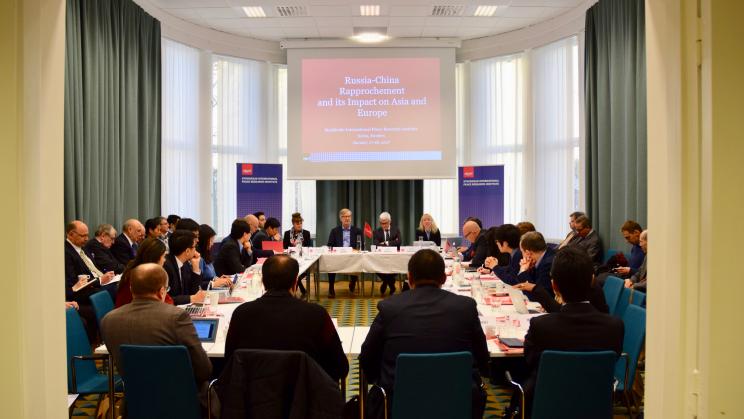
On 17 and 18 January, SIPRI held a workshop entitled ‘Russia-China Rapprochement and its Impact on Asia and Europe’. The event attracted more than 70 participants from a diverse range of backgrounds including government, military and academia. The 30 workshop presenters were from 15 countries in the regions of Europe, North East Asia, South East Asia, South Asia and Central Asia.
The first day covered non-traditional security, including issues relating to energy, resources, and development. The second day featured panels on traditional security and over the horizon issues, such as cyberspace and terrorism, arms trade and conventional military development, as well as nuclear and space modernization. The two days yielded findings that can be grouped into three main categories, namely 1) uncertainty, 2) strategic ambiguity and 3) new frameworks.
- On uncertainty, participants raised questions over the sustainability of economic growth and the statistics behind the Silk Road Economic Belt. They discussed how changes to the United States administration and external players would impact regional dynamics on such diverse issues as the Arctic and North Korea. When conventional and strategic modernization was discussed, participants offered their views on Russian concepts of the role of nuclear weapons in ‘de-escalation’ and how Chinese military advances may drive future technological and postural changes.
- On strategic ambiguity, participants focused on whether transparency serves as a stabilizing or destabilizing factor when revealing arsenal size or opening data on military exercises to potential adversaries. They discussed whether the use of political and military red lines might lead to future miscalculations, particularly on issues like Ukraine and the South China Sea. When discussing cyberspace, participants probed how hybrid warfare and new governance norms may be shaping both the civilian and military realms.
- On new frameworks, participants shared differing definitions for regional and international domains. They questioned the use of terms like ‘pivot’ or ‘peripheral diplomacy’ to describe Russia’s and China’s regional activities. Some asserted that while a Cold War no longer exists, China and Russia still follow traditional concepts of mutually assured destruction in their strategic calculus. Others advocated challenging the assumed asymmetry and inevitability of Russia ‘on the decline’ and China ‘on the rise’. There were discussions on how both countries should de-conflict their economic and security engagement and how regional actors should respond in Europe, North East Asia, South East Asia, South Asia and Central Asia.
These topics, among many others, will be explored in greater depth in a forthcoming edited SIPRI report that will contain short essays and case studies from the various participants. This report will be released by the end of March 2017.